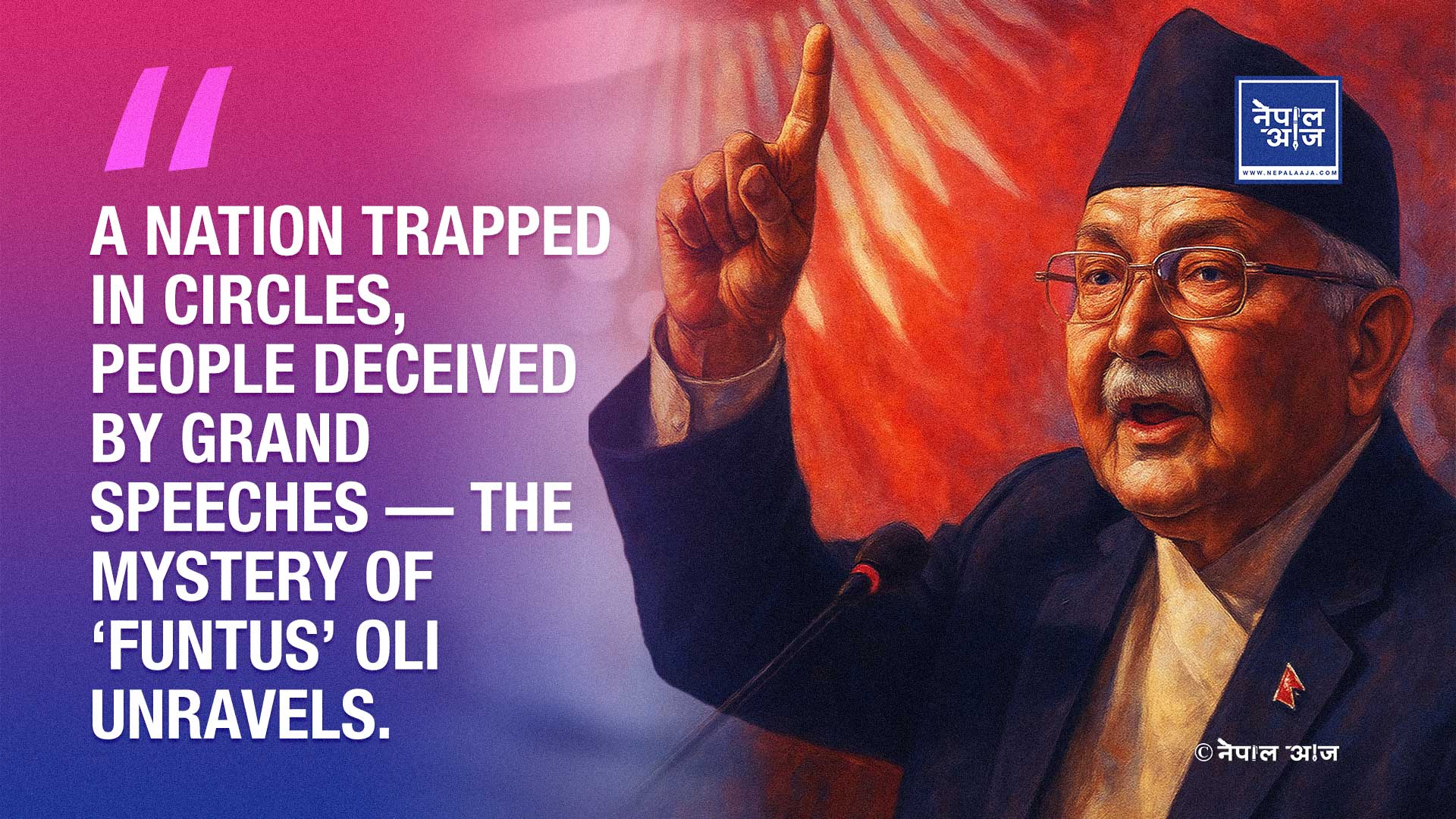Speech Won, Results Lost — Oli’s Promises and Commitments, Zero Progress!

Kathmandu — A new investigative report by Nepal Aaja has revealed that none of former Prime Minister Khadga Prasad Sharma Oli’s eight major promises during his tenure were ever fulfilled — not a single one. The eight grand pledges — a national shipping line, a household gas pipeline, petroleum extraction, a cross-border “Chuchche” railway, a trade tunnel with China, an updated national map, anti-corruption, and good governance — all remain unimplemented.
A satirical Nepal Aaja special report earlier titled “Gen Z Movement Defeated Oli, But the Nation Still Searches for Him!” had humorously portrayed these same pledges as “national pride projects.” But now, these promises have become subjects of social audit, exposing the undeniable realities of Oli’s governance.
Oli’s tall talks are now no more credible — not even to Indian media. His speeches heated up the nation, but the results are zero. From ships to petroleum, every promise turned out to be hollow. The people’s trust has collapsed. A government won through propaganda now stands trial in the court of evidence. Nepal Aaja exposes Oli’s saga — a history of failure.
In 2019 (2076 BS), Oli had declared, “Nepal will soon operate its own ships,” and even established the Nepal Shipping Office. Yet, according to official records from the Ministry of Finance and the Ministry of Physical Infrastructure, the office remains defunct after five years — with no ships purchased, no training conducted, and no trade service initiated.
In 2020 (2077 BS), he announced a household gas pipeline network, but the Ministry of Energy confirmed that even the preliminary feasibility study has not been completed.
Oli’s third commitment — petroleum exploration — began with drilling efforts in Dang and Nepalgunj in 2020. However, the Department of Mines and Geology confirmed the project was halted in 2022 due to budget shortages and technical setbacks.
His fourth dream — the cross-border “Chuchche” railway to China — remains stuck at the feasibility-study stage. A joint communiqué from the Ministry of Foreign Affairs states that both the technical and financial studies remain incomplete.
The fifth was a trade and transport tunnel across the Himalayas. Though a connectivity agreement was signed under Oli’s leadership, Nepal’s Department of Roads has now confirmed that the proposed project is no longer a national priority.
The sixth — protecting the national map — was symbolic but inconclusive: though Oli’s government updated the official map, no subsequent boundary negotiation ever reached a conclusion.
The seventh — anti-corruption — fell flat as his administration itself was marred by major scandals, including the Omni Medical Supplies deal, the 700-million scam, Lalita Niwas land grab, and the Giribandhu Tea Estate controversy.
And finally, his eighth — good governance and stability — collapsed when Oli himself dissolved Parliament twice, plunging the country into deeper political instability.
Nepal Aaja’s investigation cross-checked ministerial reports, government records, and commission findings. Evidence shows no structural progress, no budget execution, and no policy continuity in any of the promised projects. Oli’s speeches inspired belief, but they never turned into reality.
Social media is now flooded with remarks like “From ships to petrol — all hot air!” Citizens are resurfacing old clips of Oli’s speeches asking: “Which of these promises was ever fulfilled?” Parliamentary archives and public records tell the same story — big words, no groundwork.
The investigation concludes that Oli’s eight promises have produced zero progress. His propaganda may have won him power, but facts have proven him a failure. Nepal today demands accountability, not oratory — and that demand has already begun. The Gen Z movement is its reflection. Oli’s showmanship and flashy rhetoric deceived the nation; instead of development, the people got disappointment. The public is no longer asking for speeches — they’re demanding results.





![From Kathmandu to the World: How Excel Students Are Winning Big [Admission Open]](https://nepalaaja.com/index.php/img/70194/medium/excel-college-info-eng-nep-2342.jpg)


